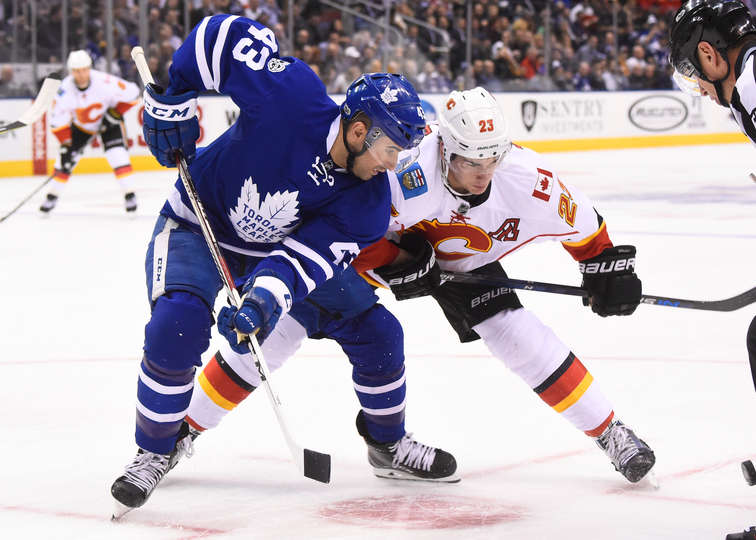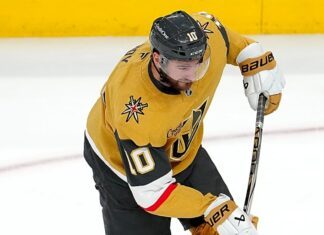Mike Babcock joined Hockey Central at Noon on Friday, touching on Jake Gardiner’s play this season, Nazem Kadri’s goal of winning the Selke, Nikita Zaitsev’s contributions, the challenge ahead for the rest of the season, and more.
Did you have to tell [Mitch Marner] to go to the room the other night, or was that one where he went, “I just can’t go anymore”?
Mike Babcock: Him and the trainers. Let’s just get one thing straight. I’m not telling anyone to go to the room.
The other night there was the play on the first goal where it got tangled up in Curtis’ pads. We were wondering, “geez, do you challenge on that?” It looked like they pushed him in. You didn’t get a feed of the play-by-play angle or that one angle that showed him being pushed in?
Babcock: I don’t know which angle we got. I got whatever angle I got. I looked at it and I didn’t think it was pushed in. When I saw the second angle, after the play had started, I thought he might have gotten pushed in. When I looked at it afterward, to be honest with you — and I spend quite a bit of time on it – I thought we made a bad play and I thought it was a good goal. Would I have challenged it if I had seen the second one sooner? Might have. In hindsight, if I was doing it all over again, do I think they would’ve overturned it? No, but I still might have challenged it.
We see you looking down there often. Obviously, there weren’t monitors on the bench the whole time you’ve been in the NHL. How much are you using that television at your feet there?
Babcock: I use it on those plays. We use it for the offside. It’d be nice if it wasn’t at your feet and you weren’t looking down there, but it is. I like it better there than behind me. Is it a good thing, a bad thing? I don’t have a clue, to be honest with you. What we try to do – the guys in the office have better screens than us. We’re trying to go off their lead.
Maybe a jump-off point for this is a player like Jake Gardiner. In your mind, how do you make the decision when someone is ready to face tougher competition? When do you want to sort of bump them up the lineup a little bit, and face a top line every now and then? What goes into making that decision?
Babcock: What happens is, as much as you want the perfect matchup every single night, you never, ever get the perfect matchup based on what I’ve seen or whatever. I’ve seen those guys in the situation that I maybe hadn’t thought was perfect for them and if they handle it, you go with it. I think Gardiner has come a million miles. He is one of these guys who people love not to like at times, but he’s such a great breakout machine. He moves the puck so good. Now, does he do some things that are high risk? Yes, but he really can move the puck and he doesn’t spend a whole lot of time in his zone. Some nights, when he’s not as good, he spends too much time in his own zone.
How much is Nikita Zaitsev now than he was at the start of the year?
Babcock: That’s a great question. Here is the question I asked Lou the other day: “Where would we be if we didn’t have this guy?” Flat out. He’s playing on our number-one pair. He’s playing the matchup minutes. He’s a competitive guy. Blocks shots. Cross checks really nice. Gets points for you. I think he’s a really good player. We’re just lucky we got him, to tell you the truth. He’s such a quality teammate and takes his profession so seriously. It’s been a huge coup for us to have him.
What did you think of him in the World Cup?
Babcock: I liked him at the World Championships. Obviously, we saw him in the summer and talked to him. We spent all last year on the phone with him and texting him and working him to try to get him to come. And then I really liked him last year at the Worlds. I mean, I thought Russia had a good team at the World Cup, but until you get him here, and until you play him every day in the NHL… I’ve been wrong on so many guys, it’s not even funny. To think it’s easy to say they’re going to transfer and they’re going to come right in and do what they’re capable of doing… it’s not as easy as it sounds. You don’t know how competitive the guy is until you have him every single day, and that’s what’s gotten him over the top here.
To shift you a little away from hockey for a moment – I’m thinking you’re almost two years now living in the city of Toronto. What’s that experience been like for you versus maybe what you thought coming in? How’s it been for you and your wife?
Babcock: The biggest thing for me is – as much as we came to Toronto – I didn’t spend a whole lot of time in the city, and didn’t know how great it was. For my wife and I, because our kids are gone now, it’s been an absolute homerun. We’re fortunate that we live in the city and there are so many things going on in the city. The city is spectacular; there is lots to do. But my favourite thing about the city is how crazy people are for the Leafs. I was real fortunate I was in Anaheim when the team was really good there and we lost in the Cup Finals and the town was fired up. I was in Detroit and we had an amazing run. But this is a whole new level of fans loving their team and wanting to support their team, and so it’s so imperative that we get this team to its rightful place. I just think the city is spectacular for the Leafs. The following we have couldn’t be any better. This is going to be a hotbed for hockey again. Players are going to want to come here. It’s that special of a place.
Do you ever just say, “you know what, I’m taking the wheels out to a local park and going for an outdoor skate with the kids?”
Babcock: I got them in my truck, and I can see the rink from my condo. I just walk down there and go. It’s awesome. Our son and I… He was here at Christmas, he’s a college hockey player, there were kids playing on it, I could see from the window. I said, “Grab your stuff.” We got there and there was a father-son game going on. We just put our stuff on and joined the dads and played with the dads. It was great. All of those things are spectacular. That, to me, is the different part of Canada – you grew up like that. I can still remember living on 15 Wapoos Bay in Leaf Rapids, Manitoba, sliding down the back hill, going down to the beaver dam, and playing with my buddies. I can remember that like it was yesterday. That’s all part of being here.
How did you play there at Christmas time?
Babcock: I was dialed in. You can bet on it.
Just a quick comment on Nazem Kadri – under your tutelage, we’ve seen real strides with this player off the ice and then on the ice. There were a lot of questions about whether he can reach this level.
Babcock: Well, I think Naz is just starting his journey. He’s way better than he’s playing. He can be way better. He’s going to start dominating the faceoff circle, which is important for him. He’ll be better in the faceoff circle. He’ll continue to get better without the puck and in doing so will end up scoring more. He’s a kid, to me, who took a huge step this summer with his training. He has to take another step again this summer with his training. He’s got a lot of growth potential. I’m impressed with him because he’s a bit nasty. He’s competitive at game time. He’s learning to work harder every day. He’s becoming a better pro and he’s a big part of our team.
Is he legit in the Selke conversation in your estimation, Mike?
Babcock: This is what I’d tell you. When that first got talked about, I said to him, “do you really want to win that trophy?” He said, “Absolutely, one day I’d like to win that trophy.” I said, “then we’ve got lots of work to do.” But he wants to win it and I’m going to do everything I can to help him.
Did he bring up the Selke or did you?
Babcock: I don’t know who brought it up. Someone might have been busting his chops, you know what I mean? One of the boys. I happened to be in ear shot, so I grabbed him.
How do you practice right now? How do you coach when you’re playing every second day the way you guys are over the next month?
Babcock: Well, we’ve been fortunate this past week. We just had two practices, so we had one here after a day off and one here earlier in the week after a day off. Those would be the first practices. When I thought we really started losing touch with our game is when we went into the bye week and came back and we wanted to be all positive and then, “boom.” To me, over a period of time, our structure left our team a little bit. I’m optimistic we can get our structure and our work ethic and our skating back. We’re having some good practices. And then, obviously, you’ve got to be fresh for games. You’ve got to be smart about what you’re doing.
Coming off that loss in Columbus, Mike, did you have any specific points you were trying to hammer home in practice today leading into your game against Ottawa?
Babcock: 100%. I watched the Ottawa game last night. I really was impressed. I thought they did a good job. We showed some clips from our last game and some from Ottawa and prepared specifically to have success. I think one of the biggest things is understanding how you need to play versus how you want to play. We’re not in junior anymore. There is no space in there. We’re not in college anymore. There’s no space out there. We’re not in the American league anymore. There’s no space. Understand there is no space. So how are we going to create it and make plays and be on the winning side? That’s one of the biggest things we go over on a daily basis.































